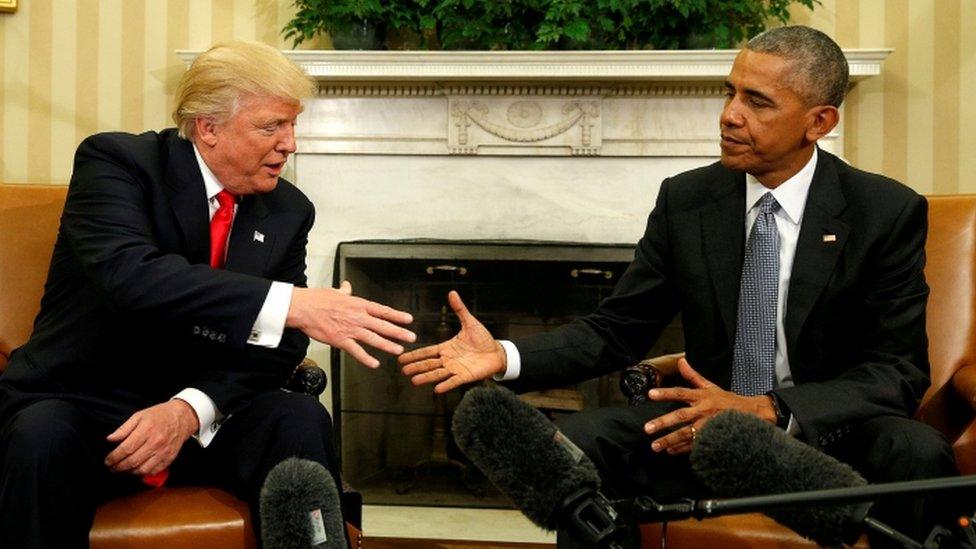Trump wire-tapping claims 'simply false' - Obama spokesman
- Published

Mr Trump called Mr Obama a "bad (or sick) guy" in a series of tweets on Saturday
President Donald Trump's accusation that his predecessor ordered his phones to be tapped is "simply false", Barack Obama's spokesman has said.
Kevin Lewis said that "neither President Obama nor any White House official ever ordered surveillance on any US citizen".
Mr Trump had tweeted: "Terrible! Just found out Obama had my "wires tapped" in Trump Tower just before the victory. Nothing found. This is McCarthyism!"
He gave no details to back the claim.
In his statement, Mr Lewis said a "cardinal rule of the Obama Administration was that no White House official ever interfered with any independent investigation led by the Department of Justice".
The statement left open the possibility that a judicial investigation was taking place.



Earlier Ben Rhodes, who was Mr Obama's foreign policy adviser and speechwriter, also addressed Mr Trump's claims in a tweet, saying: "No President can order a wiretap. Those restrictions were put in place to protect citizens from people like you."
Mr Trump, who is at his Florida resort, fired off a series of tweets from just after 06:30 local time (11:30 GMT) on Saturday.
He called the alleged tapping "a new low" and said "This is Nixon/Watergate" - referring to the most notorious political scandal of 1972, which led to the downfall of President Richard Nixon after a web of political spying, sabotage and bribery was exposed by the media.
McCarthyism, which Mr Trump referred to in one of the first posts, relates to the persecution of US Communists and their allies led by Senator Joe McCarthy in the 1950s.
In other developments on Saturday:
ABC News quoted senior White House sources as saying President Trump had gone "ballistic" at an Oval Office meeting on Friday, in particular at the decision of Attorney General Jeff Sessions to remove himself from an investigation into alleged Russian interference in the election
Politico and CNN report that Mr Trump will sign as early as Monday a new executive order imposing a travel ban on people from some Muslim-majority nations. The first was halted in the courts
Trump supporters have held scores of rallies in locations across the country, ranging from several dozen people to the low hundreds, under the banner of the Spirit of America

Partisan maelstrom: Analysis by Anthony Zurcher, BBC News, Washington

As the Trump administration continues to be bedevilled by a drip-drip of revelations about ties to Russian officials during and after last year's election, the president has seemingly settled on the identity of the malevolent figure behind the turmoil.
Barack Obama.
It was the former president, Mr Trump asserts, who is guilty of meddling in the 2016 campaign, not Russia. Mr Obama, he says, is the one whose deeds merit investigation.
The president's early morning tweets follow an interview on Tuesday in which he accused Mr Obama and "his people" of orchestrating recent political protests across the US and of being behind the government leaks that have embarrassed the White House.
There is scant evidence supporting these allegations, but charges like these fit a pattern. Mr Trump is at his sharpest when pushing back against perceived antagonists, such as Republican primary opponents like Jeb Bush, establishment conservatives who resisted his nomination or Hillary Clinton in the election.
Now Mr Trump is returning to his favourite political foil - a necessity given the current Democratic power vacuum in Washington. It could mark the beginning of a massive water-muddying effort in which any forthcoming investigatory revelations are swept up in a growing partisan maelstrom.

Mr Trump's tweets followed allegations made by conservative radio host Mark Levin, which were later picked up by Breitbart News, external, the website run by Steve Bannon before he became chief Trump strategist.
Mr Levin said there should be a congressional investigation into what he called President Obama's "police state" tactics in his last months in office to undermine Mr Trump's campaign.
Breitbart summarises Mr Levin's accusations, which say that:
The Obama administration sought, and eventually obtained, authorisation to eavesdrop on the Trump campaign
It continued monitoring the Trump team even when no evidence of wrongdoing was found
It then relaxed the NSA (National Security Agency) rules to allow evidence to be shared widely within the government

Read more:

Mr Trump has come under constant pressure from FBI and congressional investigations into alleged contacts between his aides and Russian officials during the election campaign.
Media reports in the past few weeks have suggested a warrant was sought under the Foreign Intelligence Surveillance Act (Fisa) last summer in order to monitor members of the Trump team suspected of irregular contacts with the Russian officials.
The warrant was first turned down but then approved in October, according to the reports. There has been no official confirmation and it is also not clear if this evolved into a full investigation.

What is the Foreign Intelligence Surveillance Act (Fisa)?
Created in 1978 to establish procedures for the physical and electronic surveillance of foreign intelligence agents
Intended to cover foreign spy programmes but can be targeted at US citizens
The president cannot order a Fisa warrant
Officials at the justice department must seek permission from the Fisa court

Some Democrats feel Mr Trump's latest tweets are an attempt to focus attention away from the Russian affair.
House Democratic Leader Nancy Pelosi said: "The Deflector-in-Chief is at it again."